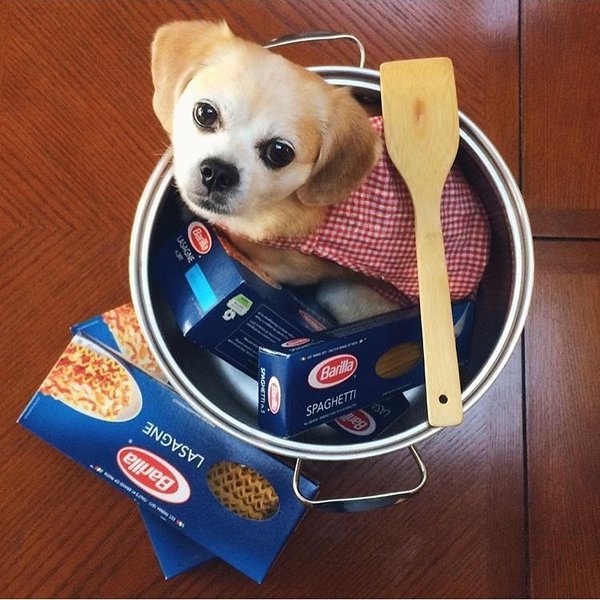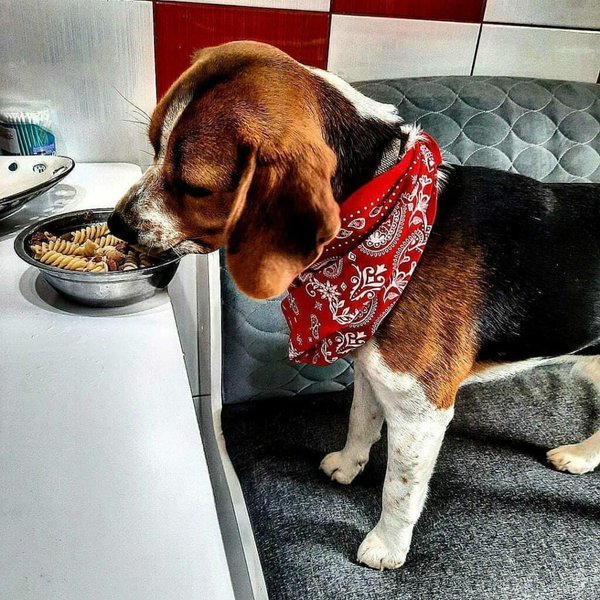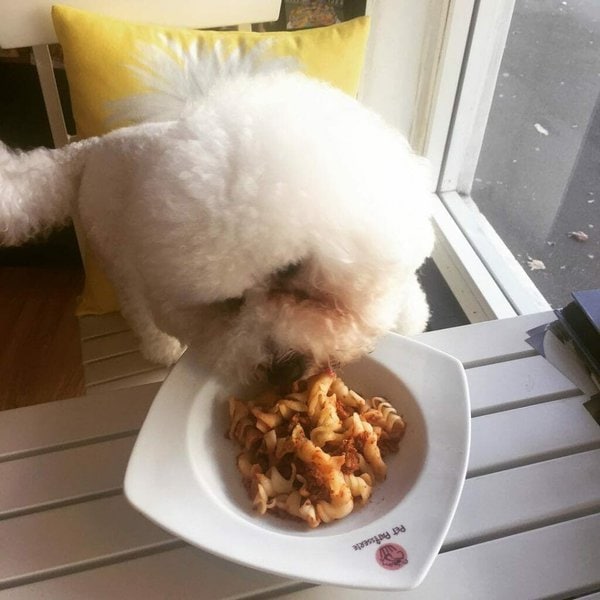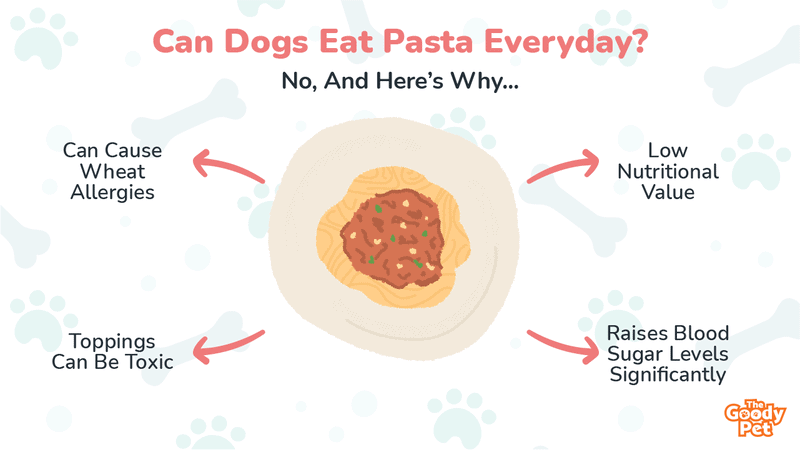We are all familiar and fell in love with that famous scene in the animated movie, Lady and the Tramp. It was when the two canine lovers absentmindedly chewed both ends of the same noodle and ended up kissing each other. Cute, right? But is pasta good for your pet pooches?
Pasta is a great source of carbohydrates and we humans love it because it tastes good, versatile, and easy to prepare. However, feeding our pooches pasta everyday may not be a good idea. In its simplest form, without any sauces or toppings, pasta can be consumed by your pooches, but only in moderation to avoid wheat allergies.
Pasta is mostly made up of refined wheat flour, some fiber, and some fats. Although it is not toxic, it has little nutritional value on its own. Feeding your pooch too much of it can likely lead to health problems later on, such as obesity and heart diseases.
How Much Pasta Can I Give My Dog?
If you are planning to give your dog pasta, make sure to always do it in moderation. Once every week should be fine, but not more than one cup per meal.
Veterinarians caution against making pasta a regular part of your pooch’s diet because this can negatively impact its overall nutrition. It is considered a filler food and not the main source of nutrients. Furthermore, if the pooch is already a little bit overweight, giving it pasta is a big no-no.
Let’s look at the nutritional value of pasta and if it is better than rice.
Nutritional Value Of Pasta
Pasta is mainly made from flour, eggs and water, so it is fine and safe to feed them pasta. Do note that it is, however, mostly carbohydrates or starch.
A cup of whole wheat pasta contains 174 calories with 73% carbohydrates, 15% protein, 11% fiber and around 1% of fat.
A cup of refined pasta, on the other hand, contains 220 calories with 78% carbohydrates, 15% protein, 5% fiber and 2% fat.
Based on these figures, feeding your pooch too much pasta daily is certainly going to put its diet out of whack. Mature dogs should get at least 10% of protein from their daily caloric intake and at least 5.5% from fats, while carbohydrates should only comprise around 50% with 2.5% to 4.5% fiber.
With such high carbohydrate values, one can see that feeding dogs too much pasta is highly discouraged. Dogs ideally and naturally get their energy needs mostly from protein and fats. Both their tooth structure and intestinal tract have also been designed to an omnivorous diet through years of evolution. Some even suggest that dogs do not need carbs.
In addition, a lot of pasta available on the market today are often made from refined flour which can increase their blood sugar levels significantly when consumed. This may lead to rapid weight gain, breathing problems, high blood pressure, diabetes and eventually, heart disease.
Is Rice Better Over Pasta?
Cooked rice is gluten free, so it is definitely better over pasta. Some dogs suffer from gluten sensitivity or celiac disease which causes inflammation and damage to the intestinal tract resulting in poor absorption of nutrients.
Some veterinarians will recommend cooking white rice with some chicken when your dog gets sick with digestive problems because rice is easier to digest due to its low fiber content.
Brown rice, or red rice, on the other hand, is not recommended when your pooch has tummy problems due to its high fiber content.

Can Dogs Eat Pasta And Sauce?
No, dogs cannot eat pasta with sauce. For the sake of your dog’s health, Just keep it plain and simple. That is the rule of thumb in case you want to feed your dog pasta.
Pasta sauces are usually laden with ingredients that are toxic to your pooch. These are garlic, onion, salt, oregano, and cheese.
Garlic
Garlic contains thiosulfate which is very toxic to dogs. When this compound is absorbed in the gastrointestinal tract, it causes oxidative damage to their red blood cells, developing into hemolytic anemia and eventual organ damage.
Even the powdered form of garlic is deemed toxic, so it is better to think twice before you give your pooch spaghetti with your favorite marinara sauce.
Onion
Onion is another thing to avoid. This also belongs to the same Allium family as garlic, leeks, chives, and shallots. Onions contain the compound N-propyl disulfide which destroys your pet’s red blood cells.
It causes anemia, as well as methemoglobinemia, a condition when there is no balance in the hemoglobin and methemoglobin blood cells. This results in inadequate oxygenation of your pet’s tissues.
Early symptoms of poisoning from eating too much garlic and onions are weakness, vomiting, and a pale mucous membrane. Take your pet immediately to the veterinarian if your pooch consumed excessive amounts of these ingredients.
Salt
The salt in your pasta is likely to trigger some health problems to your pet, especially if there is too much of it. Excessive salt or hypernatremia will cause the cells in the body, including brain cells, to release more water in order to balance out the amount of salt in the blood.
Symptoms include dehydration, vomiting, diarrhea, high temperature, seizures and sometimes, even death.
Oregano
Another common ingredient in pasta sauces is oregano which could cause mild poisoning when ingested by your pooch. It is not deadly, but it can create digestive issues like vomiting and diarrhea.
Black pepper is also known to cause nausea, vomiting and diarrhea if taken in large amounts.
Cheese
A lot of the cheese we put in our pastas can be harmful to our pooch like parmesan, gorgonzola, cheddar, or goat cheese.
Parmesan has a high sodium content like most hard cheeses and consuming too much of it could cause high blood pressure and obesity if given regularly.
Gorgonzola and other blue cheeses have fungi in them that can be harmful and bring about digestive problems in your pooch.
Goat cheeses like feta and brie, on the other hand, have high saturated fats that can cause pancreatitis.
Not to forget that most dogs are lactose intolerant and for some, even small quantities can result in adverse reactions.
What About Pasta With Tuna?
Yes, pasta with tuna is fine, but only when it is fed to your dog in moderation. Tuna is very rich in lean protein with lots of omega-3 fatty acids which is good for their coats, but excessive consumption is often unsafe because they may contain high levels of mercury.

What Kind Of Pasta Can Dogs Eat?
There are a plethora of pasta varieties on the market today and most of them could be given to your dog for as long as you cook it and serve it as is, without the harmful ingredients as discussed previously.
Spaghetti, penne, lasagna, or vermicelli are all fine since they are all made of the same ingredients.
Leftover spaghetti noodles that are sauce-free will probably be a great treat for your pooch if you freeze it beforehand. The extra crunch will add a nice texture when eaten but make sure it is not too long and in bite-size pieces, so that they will not choke on it.
What about whole wheat pasta? Those made from beans, egg noodles, and ramen noodles, are these safe for your pooch? Let’s tackle them one by one…
Whole Wheat Pasta
There is not much difference in the nutritional value of regular pasta from whole wheat pasta except for the added fiber content in part because it is not highly processed. It still retains some of the bran and germ of the wheat. Just make sure that your pooch is not allergic to wheat.
Pasta Made From Beans
There is another type of pasta on the market that is made from chickpeas, lentils, and black beans. While these may be considered healthy for us humans as an alternative protein and fiber source, it is another thing for your furry pets.
Excessive consumption of these can produce stomach gases for dogs and their stomach may have trouble digesting them properly. Moderation is still the key when feeding your pooches pasta.
Are Egg Noodles The Same As Regular Pasta?
Egg noodles, like wonton or chow mein, have almost the same ingredients as regular pasta but with more eggs added to them. They have low-fat content, moderate protein, less fiber, more cholesterol but less glycemic index.
So, consuming egg noodles would not give your pooch the sudden sugar rush. It is also not toxic to dogs if you keep it plain and again, when it is fed to your dog in moderation.
Can My Dog Eat Instant Ramen?
You can give your dog plain instant ramen but only in exceedingly small amounts. Instant ramen or noodles have high salt and fat content to keep it elastic and springy. They have no nutritional value for your pets and feeding them regularly with these would cause health problems like pancreatitis, diarrhea, and obesity.
Also, avoid feeding your pooch the instant ramen which you have added the flavoring powder and seasoning oil into. There are lots of garlic, onion, and artificial additives that may be toxic to your beloved pet.






